Related Blogs
Table of Content
- What is Custom Software Development?
- Bespoke Software Development: Benefits
- Why Outsource Software Development Project?
- The Who, Why and When of Custom Software Outsourcing
- How to Choose a Right Vendor For Custom Software Services?
- What is a Software Development Agreement?
- Non-Disclosure Agreement in Software Service Business
- The Cost Factor in Custom Software Development Projects
- Custom Software Development Methodologies
- Software Development Maintenance And Support
- Best Practices in Custom Software Development
- Final Words
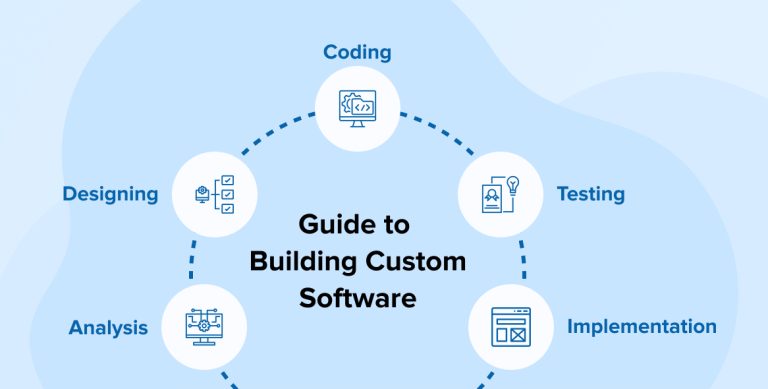
Think back to some twenty years ago, the software development market back then had a completely different scenario compared to what it is now. The major difference that companies find now is the liberty to develop any type of application which in the IT industry is termed as developing custom software applications based on the desired technology stack, required skill-sets, expertise, and development methodologies.
To stay relevant, businesses nowadays are readily accepting changing trends of the digital market, and software development companies are an aid to it. A custom software development company can help businesses to exploit the maximum potential of custom software at their fingertips. For businesses looking for custom software development, this blog is a comprehensive guide to knowing the nitty-gritty of custom software development and will help you understand different phases of software development like requirements gathering, actual development, deployment, and maintenance. In addition, this blog will also provide information on how to identify the right custom software agency, how to communicate with the development team, and what aspects are to be taken care of while understanding the software development process. Also, we will take you through an insightful understanding of how vital NDA is, its needs, and a comprehensive take on how to safeguard your IP rights, why project agreements are important, and similar other information.
Businesses might have a different outlook towards developing a custom software application or would rather prefer to buy off-the-shelf applications for their day-to-day business processes. But if you are looking for a custom application for your business, this blog will enlighten your thoughts on custom software development services by showing some valid points of custom software development and a completely different perspective. Not all businesses find custom software development suitable for their processes and scenarios against ready-made products. So this comprehensive guide will help you to choose the best tailor-fit agency for your software applications and the deciding factors on whether you should go for it or not. Let’s start with the basics.
1. What is Custom Software Development?
Changing spheres of the consumer market have made businesses chase innovation like never before. Consumer needs are just getting complex and tougher every passing day and hence there is always a necessity to develop custom-made applications. It clearly implies that customized software solutions are best-suited for changing business needs. Do we really understand the term custom software development service or it is just an application development service that is used by many other businesses.
Definition: “Custom software development can be defined as the process of designing, creating, deploying and maintaining applications that meet the unique business requirements of a specific company.”
It is also widely known as bespoke software or tailor-made software. Software products available in the market are known as commercial off-the-shelf software (COTS). There is a lot of difference between commercial off-the-shelf applications and custom apps that need to be understood before deciding which one to use.
For more clarity let’s take the example of Microsoft office. It is a packaged application combined together with multiple features that meet the general requirements of millions of organizations or individuals. While on the other hand, if your business wishes to allocate work to contractors and manage specific workflows, an organization needs to build its own custom software applications. This need can only be served by custom software development companies. To more elaborately understand the difference between the two, we have researched both the topics from the grassroots level and created a table that shows the major differences between customized software development and off-the-shelf products.
| Custom Software Development | Commercial Off-the-Shelf Software (COTS) |
|---|---|
| Custom Software development is designed to meet customized business requirements. | Customizing COTS is challenging sometimes customization is not possible and business requirements are not met using Off-the-shelf software. |
| Custom Software development demands thorough testing at all stages of development. | While in COTS tried and tested methods are only applied and so they are less prone to bugs. |
| Custom Software development is costlier initially as it depends on custom business needs | COTS has a lower-cost investment compared to others since it is shared between multiple organizations |
| As the name suggests Custom software development is specific to the organization and not sold as per others’ needs. | COTS is sold as a packed commercial product for multiple businesses |
| The development cycle is longer in the case of custom software development and hence considerably large time is estimated for the completion and implementation of projects. | COTS is readily available in the market and so just implementation and training time is required which is much shorter comparatively. |
| Requirements gathering and testing happen organization-wide to check if a developed software solution fits the business requirements. | In COTS there are free trials available to match business needs. |
| Adopting custom software development in business makes changes easier. | In COTS, most of the time changes are not possible and purely dependent on vendors. |
| Custom-developed software has all rights reserved to the payer. | While in COTS, the rights are owned by the organization that creates the application. |
Once the business decides on why custom software applications are beneficial, it’s time for them to know how these applications can make profitable changes to your business. The sole agenda of any business is to make a profit for its business stakeholders and this can only be achieved by increasing productivity and growth and thus accelerating profit rates. To improve accuracy and efficiency businesses build software that would do all the tasks automatically by reducing the manpower requirements while increasing the productivity of the organization on the other hand. Thus, custom software application businesses have an upper hand in competition and in no time can improve business performance by deviating their focus from ready-made apps to tailor-made application suites.
2. Bespoke Software Development: Benefits
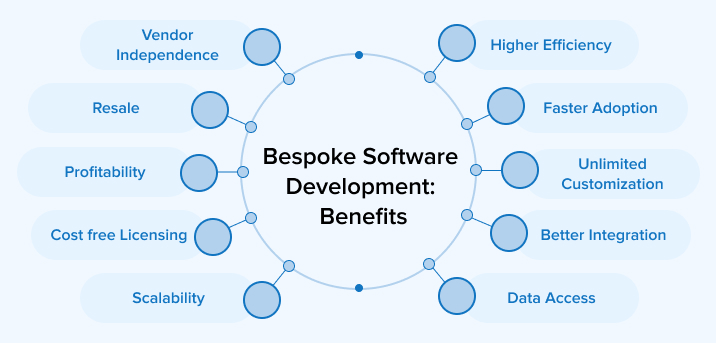
Customized software development companies understand the change a tailor-made software can aid in the business yet there are multiple organizations reluctant about outsourcing because of a lack of knowledge and unaware of the advantages it offers.
Here are some non-negligible factors of custom software development that contribute to making custom applications robust, future-ready, and performing.
- Higher Efficiency
Customized software apps are specifically designed to meet business needs that can smoothen the haywire business process. Since the applications are already programmed the way business functions, they know their jobs and hence the businesses can achieve better productivity, efficiency, and a competitive edge over their peers. - Faster Adoption
The developed custom application has tailored business solutions and features and so organization-wide adoption is faster and training time and cost is comparatively less. The organization implementing the custom-developed software solution doesn’t need to change the way of working according to the software but the software solution is developed according to the way they work. - Unlimited Customization
Businesses are free to develop whatever they want using the potency of custom software development. Custom apps provide unlimited customization facilities and various other benefits against limited customization options when compared to off-the-shelf products. - Better Integration
Application up-gradation or modernization with the development of custom apps strongly binds the existing IT infrastructure and integrates seamlessly with other applications and programs with minimal cost and time investments. - Data Access
Access to data through the developed application is complex, especially when the application is ready-made and doesn’t allow customization. While on the other hand, if we use custom applications, access rights can be easily managed from scratch at granular levels. - Scalability
Customized applications are considered the most stable and flexible applications. With the growth of the organization, custom apps grow equally by incorporating the latest features and enhancing the processes. In turn, if customized applications are developed suitably give longer life and offer software scalability. - Cost-free Licensing
There is no licensing fee involved when the application developed is customized and owned by the organization. Any new features or users can be easily incorporated without any additional expenses. - Profitability
It’s possible for businesses to earn from custom app development. Depending on the terms and conditions of the customized project, businesses can license or sell their customized apps to other organizations and get large margins of profit based on how demanding their application demand is and how much the market needs. - Resale
Custom apps have certain intellectual rights that need to be adhered to by businesses before the development process is initiated. An organization that pays custom software development firms for creating applications has full rights on IP, source code, patents, copyrights, or trademarks. So, if they wish to resale the application for profit or business demands they can. - Vendor Independence
An organization that pays for custom app development owns all the rights and at any time they can shift their development from one custom software development agency to another. So they are not locked to a particular vendor. Vendors can never take advantage of software development platforms that organizations pay hefty costs.
3. Why Outsource Software Development Project?
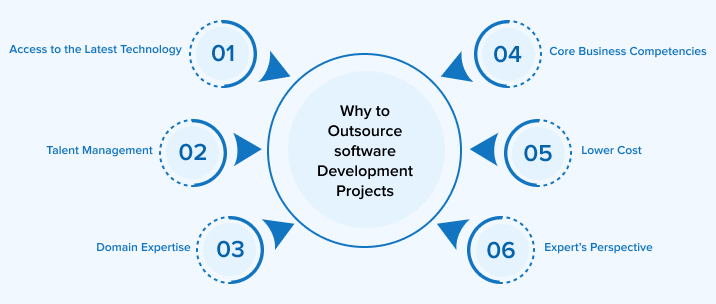
Your business goals are set free to achieve multiple successes stones as they could. To accomplish those objectives, businesses follow a growth path and achieve these goals by developing apps to streamline their processes. Extending the limits will offer businesses higher productivity, growth, and profitability but will also force them to take up some challenging tasks which can turn out to be a business barrier. Thus, to succeed businesses need to be quite clear with whatever they choose to create and should be flexible and adaptive to the latest cutting-edge technologies. Therefore, defining the applications developed are 100 % customized and scalable catering to tailored business needs.
It is not necessary to build an application in-house, there are multiple custom application development companies excelling to develop unique and high-performing software & mobile apps. These software outsourcing companies offer a variety of aids to businesses which turns out to be fruitful in the longer run. Here are some of the perks of what a custom software development team can offer.
- Access to the Latest Technology
Expert software outsourcing companies are continuously striving with challenging projects by offering advanced technology solutions to their clients of all sizes and domains. Business no longer has to invest hefty infrastructural costs or pay for training and hiring new employees on the latest technology. Custom software development companies provide an exclusive set of resources with a knack for technology expertise to develop software that functions seamlessly. - Talent Management
Once the business has outsourced its project to a software development provider, they have access to special talents who are proficient and experienced in enterprise application development. This reduces the cost of recruitment and knowledge management of an enterprise. Enterprise can focus more on core business and leaves their digital transformation journey into expert hands. - Domain Expertise
Software development companies work with a multitude of customers across various industry vertices like healthcare, education, financial & banking, etc. Hence these skilled custom software developers have exposure to a myriad of technology stacks and processes to help them follow industry best practices for any technical work they do. If you are looking for mobile app development, user experience skills become critical. Because customer buying behavior is heavily dependent on product experience. - Core Business Competencies
Developing a custom software application with a great user experience is definitely the need of the hour but not all businesses are able to reap benefits from it. Instead, businesses face a massive loss while experimenting with the technology. So custom software development outsourcing can help businesses focus on core competencies without facing losses. - Lower Cost
Custom software development companies offer a flexible team of resources that can be increased or decreased as per the requirements of the projects. The payment to the dedicated development team can be offered based on the specified number of developers engaged during the payment period. - Expert’s Perspective
The holistic experience of catering to different industries, domains, regions, and technology has made them specialize in customized software development bringing global experience and standards in their footsteps.
4. The Who, Why, and When of Custom Software Outsourcing
“Software is a great combination between artistry and engineering.” -BILL GATES
Definitely, custom application development is a great combination of creative thoughts of businesses and the true talent of custom software development companies rigorously engineering to develop cutting-edge applications. Developing a mobile app or an enterprise application is not a complicated process if you know what you want and how you will achieve it. But if you haven’t understood the enterprise’s needs then it can create turmoil in existing business processes and a huge loss. The right app has the capability to transform your business by conveniently streamlining processes and making business technically ahead with cutting-edge new technology keeping you ahead in the league. The moment you realize the vision of the custom software you wish to develop the next step is to find an outsourcing firm that matches your business requirements and effectively caters to all your business needs. During the research, you might encounter a number of industry buzzwords, types of software applications that can be created, different architectural types & patterns, and a variety of technical skills required to develop a mobile app or distributed enterprise applications.
Touting for a business with the utmost knowledge of software development and can intellectually convert ideas into developed custom software. Businesses have an answer to when they should outsource software development but whom and how to evaluate which technology partner can bring radical changes to your business methods. Here we can go through some critical parameters necessary while deciding to outsource.
Here’s the quick checklist required for businesses in advance to choose a software development service provider
- Before selecting the best-fit vendor, clearly comprehend the technology and service offering that your business needs.
- Make a decision on what you want from the software development firm whether to enhance the existing system with new features, develop applications from scratch, or need an eCommerce website with multi-functionalities and features.
- Research and identify whether to work with onshore or offshore software development companies.
- Create a list of custom software requirements and provide them to software outsourcing companies for analysis and quotation purposes.
- Research and analyze the size of the software outsourcing venture, its location, domain expertise, and service offerings.
- Last but not the least, keeping a note of timezone is equally important when deciding to outsource to a software business so that the developers assigned to the projects will follow your time.
5. How to Choose the Right Vendor for Custom Software Services?
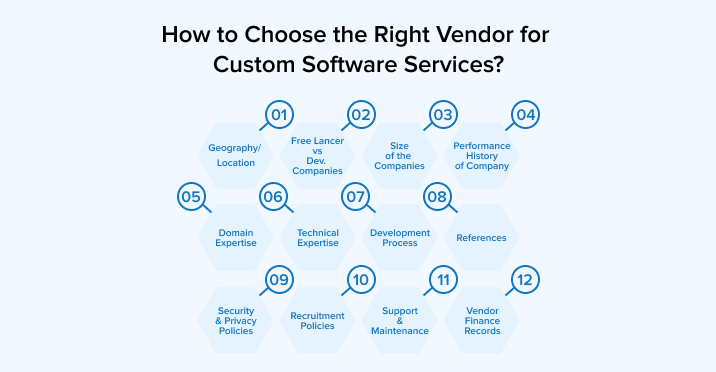
Enterprises are bound to meet essential parameters of software development when they plan to develop a bespoke application. From a gamut of software development companies, businesses can filter specific companies based on what type of software development service they offer and their focus. Here are some essential factors businesses should consider while deciding to outsource custom software development projects.
5.1 Geography/Location
The location of the custom software development firm is an essential factor for businesses to choose a provider. Onshore, Nearshore and Offshore are three options available for businesses. Onshore companies ensure faster turnaround time and better communication. Nearshore companies are located in almost similar time zones but in different countries. And offshore companies are located in different time zones in countries. Offshore software development companies offer global access to huge talent pools and cost advantages for businesses to get benefited from their services. Many offshore companies have their offices in western countries. Improved communication and requirement transfer are also possible with these offshore companies by dealing with their onsite office.
5.2 Freelancers vs Software Development Companies
A price difference is an essential factor that brings businesses to a freelancer rather than specialized software developers from renowned development companies. The reason freelancers are preferred is that they are less expensive and can be assigned to work at any given point in time. But with ever-increasing advances in technology, it is essential for businesses to have multiple skillsets for their projects like front-end developers, backend developers, database administrators, software testers, and DevOps engineers, and hiring all of these skilled resources would not be a cost-effective method. But a software development provider provides all these resources under a roof and manages all types of projects from complicated to cutting-edge technology solutions.
5.3 Size of the Software Firm
Most of the giants in the technology industry deal with large size companies doing multi-million dollar projects. While mid-size companies are happy doing isolated projects. Depending on your project size, you have to identify the right size software firm for you. For example, big banks tend to work with tech giants like IBM, TCS, and Accenture for their enterprise application development and support. While mid-size enterprises work with companies like TatvaSoft. In our opinion, you should not select an organization where your project will be generating more than 15% of their revenue. In that scenario, once your project moves from development to maintenance, team size decreases and will not affect the stability of that software development agency.
5.4 Performance History of the Software Firm
Three questions are mandatory to ask while you decide to outsource your software development project.
- Does the custom software development agency have experience in executing projects of your size?
- Have they successfully executed projects much bigger than yours?
- What kind of custom software development experience do they carry
Once you have answers to these questions the filtration process will get easier. Analyze the experience of a software outsourcing firm in different areas like enterprise application development & maintenance, mobile app development, SalesForce integration, etc. This will help you understand the knowledge they carry and their diversified role in different projects. The next question will help you understand the size of projects they have worked on and how successfully they have implemented challenging projects customized to business needs.
5.5 Domain Expertise
Looking at the holistic experience of businesses and the domains they serve justifies the complexity of projects they have developed in the past and their specific knowledge. The authenticity of work can be judged through the demonstrated work portfolios and the domains they work for like Education, Energy and Utility, Healthcare, Oil and Gas, Banking and Finance, logistics and Manufacturing, and similar.
5.6 Technical Expertise
The level of proficiency should be validated based on the technical knowledge and skills of the bespoke software development company. The type of technology offerings, the developer’s competencies, the number of specialists in each technology, and their programming experience are some vital factors for consideration.
5.7 Development Process
Every custom software development organization doesn’t operate similarly as each one has a unique business process. Therefore, it is very important for businesses to outsource to companies that follow standard practices like Agile and DevOps.
5.8 References
Decisions can be taken based on references- either from past experience of some known firm or through references of other businesses who rated the business based on their work( of course from a trusted website). Also, if you happen to meet the referrals, ask intelligent questions like what was good about their service, what was bad, what things can be improved, how to manage the team efficiently, what were the issues they faced, and how they mitigate, etc.
5.9 Security and IP Policies
Data breaches, security, or IP issues are some of the common issues why businesses are reluctant to outsource software development. So before outsourcing, it is extremely important to understand the standard security practices abided by the business to secure data, apps, their details, information on intellectual properties of the developed application, IP related agreements signed between vendors and the agency.
5.10 Recruitment Policies
The next important factor is to consider the recruitment policies of custom software development companies. The quality of your product depends on the custom software developers they hire and thus recruitment policies of that organization directly impact the quality and code of the app developed. If the hiring policies are meticulous so the developers hired will be of top quality and deliver maximum productivity to enhance the overall process of software development. Hence, vetting out good resources during recruitment by software development companies will offer long-term benefits to your business.
5.11 Support and Maintenance
To keep the application up and running, it is essential for the business to avail of support and maintenance assistance from outsourcing companies. After the application is released, depending on the functioning of the application, the support services are decided. Some businesses might need continuous maintenance and support while others may need just ad hoc maintenance to remove bugs timely, resolve errors, optimize overall performance and add new features to the application.
5.12 Vendor Finance Records
While considering hiring any custom software development agency, keep the finance aspect extremely clear. The past financial records of software development companies must be sound with zero to minimum debts portraying a strong and stable work profile. For any progressive business financial stability is an important aspect when deciding to outsource.
6. What is a Software Development Agreement?
Every business that seeks help from another business or organization is bound to sign a legal contract. This contract which is between two companies for software development is called a software development agreement. It is like a roadmap in case of future disputes and clearly mentions the legal duties of each party.
To elaborate, a Software/Project development agreement is a contract between two parties- One (the business which pays) and the Second (the supplier vendor). This agreement is bound by certain rules to provide assistance, support, and maintenance facilities during the whole project development. This business process can vary depending on the technology chosen and the team employed. Businesses may have multiple questions rising when they plan to outsource to a company located offshore. Before finalizing the outsourcing process, they should be certain about the development process, intellectual properties of both the companies, what should be made public and what shouldn’t, ownership of source code, patents, terms and conditions, and similar vital questions.
While considering outsourcing there are agreements that have rules and they should be abided by. Basically, there are two types of agreement
- Project agreement
- Non-disclosure agreement
We will elaborately discuss both these agreements but before that, it is important for us to know why businesses need to sign a project agreement when there can be a verbal pact between the two. So, when two parties are in a business sharing profits and losses, there has to be a legal pact which will be the virtue of trust. And thus there are agreements such as Project Agreements and Non-disclosure Agreements. Now project agreement is whenever a client initiates a project, or has added further enhancements to their existing project and would like to protect the idea and the intellectual properties of the project. Similarly, NDA ensures that none of the intellectual properties will be shared and must be kept confidential unless it needs to be made public.
Whenever a business works with cross-border companies, their agreements are difficult to enforce because of the different rules each country follows. This makes businesses reluctant to work with offshore companies. That’s why many businesses prefer to work with offshore companies having onsite registered offices. This makes it easier to enforce the agreement in case of a dispute.

If the customer wants to be defensive about their business operations and functions then there are a few precautionary steps that should be added to NDA to prevent the customer from any serious complications in the future. Let’s understand what are the additions and how does it impact the customer.
- Scope of the Project
In general, the scope of work includes everything from technical system designs, development tools, methodology, or the systems required to complete the project. Apart from that, everything that is needed during development and post support is also included in the agreement which is inclusive of the user and technical documentation, all hardware support, source code repositories, and hosting support necessary during the development and deployment of the software application. - Payment Terms
Depending on the scope of the project and the payment feasibility of the client the terms and conditions are decided. Some clients would choose a fixed cost model wherein after each module the payment is been performed while other clients choose monthly payment for time and material-based models where once in a month, the payment for the work is been performed. - Intellectual Property Rights
Intellectual property rights of projects include the right to a patent, trade marks, copyrights, topography rights, data extraction from database rights, the right to protect source code, and other forms of equal property rights that have a similar effect and may subsist anywhere in the world. - Penalty Terms
For any case wherein the performance of the application is not met or there is a data breach occurrence, businesses must be prepared with a penalty payable amount for this damage. In such cases, businesses can fix a penalty amount that both parties agree upon and they can have fair compensation if the customer’s needs are not met. - Confidentiality
Many times customers have to disclose business secrets to the custom software development agency while providing business requirements. To maintain the confidentiality customer and supplier must agree not to disclose any type of information about their project, business models, market strategies, trade secrets, know-how, patents, copyrights, financial information, sales distribution strategies, and internet and e-commerce strategies, or any such information which may be written, electronic in nature are collectively referred in the software agreement as “Confidential Information”. - Data Protection
A business may have collected lots of data over time which may include personal information also like name, address, email ID, phone number, etc. By law, it is required to keep this data protected. In case of breach or misuse, there are heavy financial penalties in countries like the US and UK. European Union has its own GDPR rules. While outsourcing, software development service providers may get access to data for development or maintenance purposes. In the development agreement, the role and responsibility of suppliers related to data protection should be clearly defined to avoid any disaster. - Law and Arbitration
Customers have started including a clause of arbitration in every software development contract created nowadays. Arbitration is generally an out-of-court proceeding wherein a neutral third party element called an arbitrator hears the allegations and evidence of both parties and makes a binding decision. This is an alternative method to resolve disputes by adding a clause for arbitration in SLA. - Limitation of Liability
This clause is a provision in an SLA (service level agreement) that indicates the amount and type of damage that each party will be obliged to other businesses in different circumstances. It is basically a responsibility to compensate for some failure to perform when the development needs of the service are not met. - Employee Solicitation
If the recipient has significant access to the developers of your firm and you may want to include a clause regarding the same. This could restrain businesses to hire your employees for at least 12-24 months. Sometimes the other party might not agree to do so and hence having a policy regarding that reference can limit the clients to hiring your employee and this can also be an application for the employee working for offshore projects from clients located in different countries. - Authority in Case of Disputes
In case of any conflict between the parties then businesses should be aware of the fact that the case will be operated in the judiciary location mentioned in the agreement. If the supplier is offshore and the judicial location is your location then it is always beneficial. However, if in case of dispute, if the supplier refuses to appear in the court, then it is challenging to enforce the agreement. If the judicial location is the supplier’s location then the local court can always enforce the agreement but there will be a huge loss of time and money in traveling multiple times and hiring lawyers at the supplier’s location. While dealing with offshore companies, it is better to deal with a software agency that has a registered office in your country. So that the supplier and your business can keep the judicial location as the same country. This will be advantageous for both parties as in case of any dispute they can enforce the agreement easily. - Commandment
You can protect the business from breaching the agreement by adding a clause that gives you the right to injunctive relief. This clause simply says that the other party can get a court’s permission against the disclosing agency and can prevent them from doing the breaching act. For issues involving money, injunctive relief is quite a late move.
7. Non-Disclosure Agreement in the Software Service Business
The non-disclosure agreement is used to barricade the confidential and proprietary information of the business exchanged during the engagement from getting disclosed. This agreement is made when you share the requirements for the purpose of time and cost estimation. In any case, the agreement can include a list of information that the client wants to keep confidential. This agreement isn’t bound to just source codes or software products developed business plans or any analytical detail that cannot be made public. But it depends on the business what they want to keep secretive under the NDA norm and what they want to keep public.
Key aspects of the Non-disclosure agreement
- Introduction to both the parties and their business backgrounds
- Defining the needs of what is to be kept confidential and what is not
- The term limit of the agreement
- The inclusions and exclusions of the agreement
- Repercussions of not abiding by the NDA
7.1 Types of NDA
1. Unilateral Non-Disclosure Agreement
As the name suggests, unilateral NDA is a one-way NDA where there is an agreement between the two parties and the first party( the company) is the sole owner of the information and they are releasing it to a second party (the recipient). The recipient signs the document and agrees to keep the confidentialities of the project without tampering it or leaking it to any third party. They must also agree to not use confidential information for their own benefit. Usually, this type of agreement is preferred by freelancers or consultants.
2. Mutual Non-Disclosure Agreement
The mutual NDA is for situations where each side may potentially share confidential information and may agree to keep it confidential. Generally, this kind of NDA is done as it is considered fair to both parties.
3. Terms and Conditions of Agreement
This is another essential part of why an NDA is important and what aspects should be taken care of while signing an NDA. The terms and agreements should be meticulously ideated and read before signing any NDA. Some of the basic questions that you should have while reading your NDA is
- How long should the NDA last?
- What is the reasonable term of lasting?
- Which proprietary information does it contain?
- What is excluded from confidentiality treatment?
- What are the obligations and confidentiality of the agreement?
Answers to the following question will give a clear perspective of the terms and conditions of the NDA. These questions are necessary because after certain years the cost of obligations rises, depending on the industry the agreements keep on changing.
4. Deemed Confidential
The elucidated form of which information is to be conveyed through a Non-disclosure agreement should be precisely mentioned to prevent a business from any breach. This section of NDA clearly states which information is confidential and which is not. This part will elaborate on the disclosing party a clearer vision of information without any confusion or loopholes. Specifically, if we talk about oral information, it always leaves both parties in ambiguity with respect to the pact. Deemed confidential also refers to this oral information that the disclosing party has to confirm in a written format that would notify the receiving party to keep it confidential.
8. The Cost Factor in Custom Software Development Projects
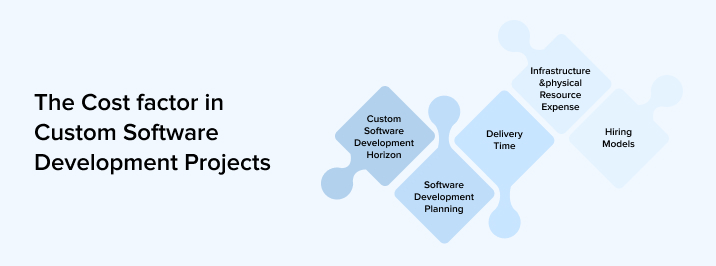
The unprecedented growth of technologies has led businesses to collaborate with global companies and do business across borders. In fact, there is just a handful of fortune 500 companies that aren’t harnessing the skills of globally proficient software developers to manage their operations. Building custom software is of equal importance to businesses in terms of time, technology, and cost investments. Hence every enterprise has to be efficient enough to take this decision on budget and other influential factors. We already know how enterprise application development adds a competitive advantage to development costs and higher price brackets. Before making a selection on the cost estimation there are certain aspects of custom software development that need to be considered.
8.1 Software Development Horizon
The extensibility and proficiency of the hired developers are the first deciding factor for businesses in paying for custom software development. The Major part of the cost estimation depends on the requirement of the project, its criticality, and technology. In addition, the number of developers and their time spent is equally important. Without a well-planned budget, the business would have to compromise on certain essential aspects or cannot afford skilled resources because of a lack of budget.
8.2 Planning
Another essential important criterion is the platform chosen to develop. Once the project initialization, requirements, and developers are fixed the next bifurcation of the cost depends on the platform. The technology stack needed, software licensing costs, and other cloud-related costs are vital contributors to cost estimations.
8.3 Delivery Time
Having rightly said “Time is money”, the time factor will decide the amount you will have to pay in case of quicker deadlines or demand to complete the project at a rapid speed than normal.
8.4 Infrastructure and Physical Resource Expense
Custom software may cost higher than expected in case of choosing an inappropriate outsourcing offshore partner. The location or geography to which the team decides to outsource will be an essential parameter to cost as well.
Just like the development cost in the Philippines will be different in compared to the cost provided by software development company in India. So if you don’t choose the right location for outsourcing then you might end up paying some extra amount than required. Choose a technology partner wisely.
8.5 Hiring Models
Each enterprise follows a different hiring method and depending on the hiring structure the cost is estimated. Depending on the experience of the team and their proven track record the hiring models can be finalized. The most common types of hiring models are the Dedicated development team and Fixed price models.
- Dedicated team
In this model, businesses can hire a dedicated team of developers for a fixed project. The organization gives clients the freedom to choose the number of developers they want and to what time period. They can increase or decrease the team size as per the project demands. If your project requirements are variable then this model can be beneficial. - Fixed price model
Fixed cost models give the organizations an exact idea of the cost and time required to complete the project. Majorly, this will be applicable to pre-defined projects which come with a fixed timeline and price structure.
9. Custom Software Development Methodologies
Custom software services need are ever-changing as per the progress of businesses and their venture into newer avenues. As per the changing dynamics, businesses are trying to place themselves in the best possible way to maximize profitability. The standard methodologies are aimed to finalize features, agreeing on time, budget, technology stack, feature enhancements, code quality, and overall software development quality. And to achieve all of these businesses use some special tools and methodologies to manage the project and process of an existing business.
Some of the common development methodologies include:
9.1 Waterfall Model
One of the most common and conventional methods of software development is the waterfall method. As the name suggests waterfall methodology works flawlessly like a waterfall with its defined set of phases and the following sequence.
- Requirement specification
- Software designing
- Integration to an existing process or creation of a new process
- QA/Testing
- Deployment
- Maintenance
Beginners who are naive to software development can efficiently gain the benefits of waterfall methodology. It is simple to use, manage and maintain because of its simpler linear sequential method of implementation. Once you have implemented the changes, rectification or changes are not possible because of the approach it follows. But since it saves a significant amount of time and delivers qualitative codes at a faster turnaround time, therefore it is one of the popular custom software development methodologies.
9.2 Agile Development
The agile method of development uses a successive iterative approach to develop apps wherein the whole process is smartly bifurcated in multiple phases. The whole process of testing, validation, integration, and deployment is performed in each phase, and versions of the products are developed. The main benefit of this methodology is that you can always look back to the previous phase and rectify the errors. This is an adaptive approach used by most clients when their requirements are wavering. Direct communication with the client and continuous feedback makes the software robust and scalable.
9.3 Scrum
This development methodology enables businesses to Fastrack their Software Development Life Cycle and can be easily applied to any critical business process. The Scrum team initiates the project with brief planning, then a detailed analysis of the holistic project w.r.t other technology departments, and later the development process is implemented. The scrum team consists of cross-functional engineers who uphold expertise in analyzing requirements, designing, coding, testing, and installation. This is a flexible approach where if the user needs are changed they will be quickly developed and reflected in the next sprint.
9.4 DevOps
With a perfect amalgamation of Development and Operations – DevOps easily manages critical and mundane business processes with ease and simplicity. DevOps has a strong rapport with agile and lean approaches to maximize the effectiveness and reduce time to market. DevOps keeps an equilibrium between cross-functional departments and enhances effective communication that optimizes the overall development tasks. The fundamental aim of DevOps is to develop transparent communication between technology specialists and operational managers to create faster and high-performing applications.
10. Software Development Maintenance And Support
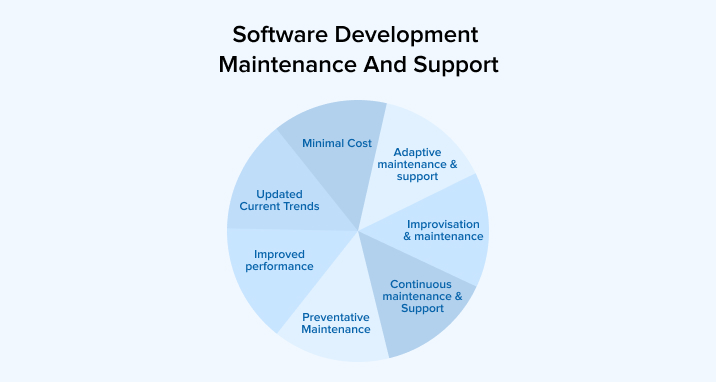
Businesses need to maximize their efficiency of software application development with minimal risks and errors. More than just development, every developed application needs continuous support and maintenance. Normally, software development teams are overloaded with tones of applications hindering their basic process of maintenance. End-to-end application development includes everything from development, design, QA/Testing, deployment, and maintenance. Software maintenance and real-time support enable businesses with high-performing sustainable apps and lower overhead costs. When we talk about maintenance, it is inclusive of up-gradation, maintenance, app migration, support, and future enhancement.
An application can be maintained in multiple ways and thus there are different types of software maintenance services
- Adaptive Maintenance and Support
Adhering to the latest technology trends, the application demands maintenance, and support assistance for businesses to transform apps into next-gen applications. Changes such as regulation changes, configuration changes, modifications to current software, operating system upgrades, or data format changes are some of the adaptive and maintenance changes. - Improvisation And Maintenance
Running applications with functional issues such as logical errors, coding errors, or designing misfits might hamper the overall performance of the application. Correcting and fixing these errors enables the software application to be bug-free and perform better. - Continuous Maintenance and Support
Upkeep applications with the latest technology support, modifications, and future enhancements, businesses need to continuously examine software performance, keep track of each update and concurrently upgrade it as a part of continuous maintenance so that the application never breaks down and delivers consistent output. - Preventative Maintenance
As a proactive measurement from past experience of developing the same or similar type of software application probes businesses to take preventive measures for maintenance and support. This will alarm businesses of any type of futuristic problems that may degrade the quality performance of the application to be treated in advance. With continuous Maintenance and Support, businesses can achieve wider benefits from software development. - Improved Performance
With timely updates, support, and maintenance processes, all the software applications of the business have now become multi-functional, high-performing, and robust architecture. - Updated Current Trends
Real-time application support allows businesses to jump to the latest trends by staying abreast of evolving technologies and trends. Application maintenance can help you pave your own path with cutting-edge software solutions and get ahead in this digital market. - Minimal Cost
Thinking that a one-time investment is a cost-effective solution for businesses is an incorrect ideology. Getting up-to-date on technology changes for cloud-based software solutions is a lucrative option that covers most of the expenses including maintenance costs too.
11. Best Practices in Custom Software Development
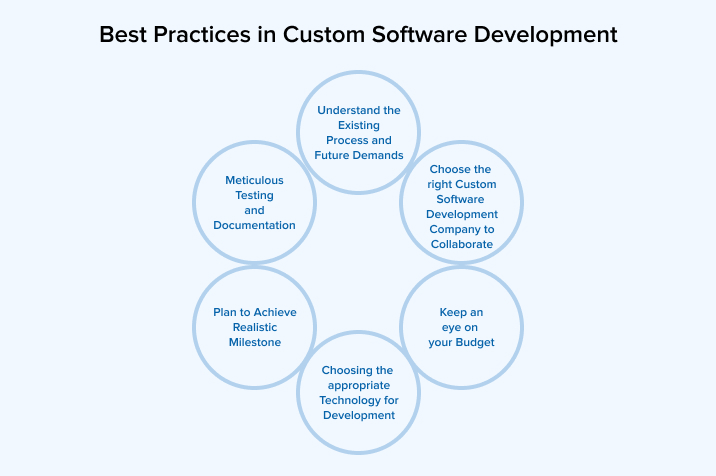
Undoubtedly, developing custom software is an indispensable part of every business which might seem challenging at first instance. Not all organizations are able to afford to make mistakes with the risk of bearing monetary losses. Though the objective of custom software application development is extremely fruitful, it could only reap benefits if businesses know to choose the right outsourcing partner. In any case, if the business is unable to partner with an expert software application development firm then as per the standard norms followed worldwide, we have mentioned a few handfuls and efficient practices for software development that could be advantageous to the business in transforming their business with technology-enabled solutions.
- Understand the existing process and future demands
A fundamental reason for outsourcing is the lack of skilled resources and the inability to understand the need. So before you decide to outsource, analyze whether a custom software will bring a game-changing effect to your organization, and if your answer is “Yes” then start evaluating your present process by looking at the system from the grassroots level. Also, a thorough understanding of the current process, what to be achieved using this custom software, and how could the current state of the agency be improved using technology understanding. - Choose the right custom software development company to collaborate
In case you think you know what you want, now the next step is to hire the right resources to work for you. Software development is a critical process and not everybody can match your needs. So, check with your internal IT team, software development vendors, and companies. Start the filtration process by exploring each custom software development firm’s website with the its location, company size, domain expertise, References, organization history, Security, and IP policy. - Keep an eye on your budget
The key important consideration here is to find a custom software product development agency that fits your needs and budget. So while you find a technology partner, make sure your business-critical needs are effortlessly met within your estimated budget and stringent delivery timelines. - Choosing the appropriate technology for development
Your first and foremost goal is to understand why you need this custom software and what benefits it will offer. Your needs can be anything from automating the process to accelerating productivity, improving inefficient processes, or making the customer experience incredible. Once this has been identified, it would be quite easy for businesses to approach experts and match preferred technology as per their business needs. - Plan to achieve realistic milestones
Your application needs consistent testing performed by experts. Since your software application needs can be unique, anything that is created should be tested and accomplished with qualitative benchmarks and then set a real milestone. Testing application is significantly important otherwise it has the potential to damage your customer base and brand image in the longer business run. - Meticulous Testing and Documentation
Once the software application is built, the most essential stage is to check the versatility of the software developed in all environments. Testing an application using all essential parameters will make the application run seamlessly on different devices and browsers before going live and will avoid unnecessary mistakes. In addition to testing, finely documenting the entire process is another essential factor in all stages of development and implementation.
12. Final Words
Running through the whole discussion, I think Custom software development is here to stay and grow. If there is anything that could bring change to the digital market is by developing custom software applications tailored to business needs. In the upcoming years, more and more businesses will be adopting this culture of offshore outsourcing to countries like India, and hence our extensive blog will be your guide. Our extensive blog will help you have fine-grained control over outsourcing, what terms are important, and the business gains in the future. Custom software will become the backbone of your business progression and the custom software developing companies will back you with their robust, responsive, and high-performing services.

Kamal Sharma
Kamal Sharma is a VP of TatvaSoft which is a custom software development company. He is an accomplished Business Strategist and Tech Visionary with wide-ranging experience in the technology sector. He leads the business operations of the company and creates vision & strategic goals for his colleagues.
Related Service
Custom Software Development
Know more about Custom Software Development Service
Learn MoreSubscribe to our Newsletter
Signup for our newsletter and join 2700+ global business executives and technology experts to receive handpicked industry insights and latest news
Build your Team
Want to Hire Skilled Developers?



Thanks for the post very useful information Thank You for Sharing this post and help full content.